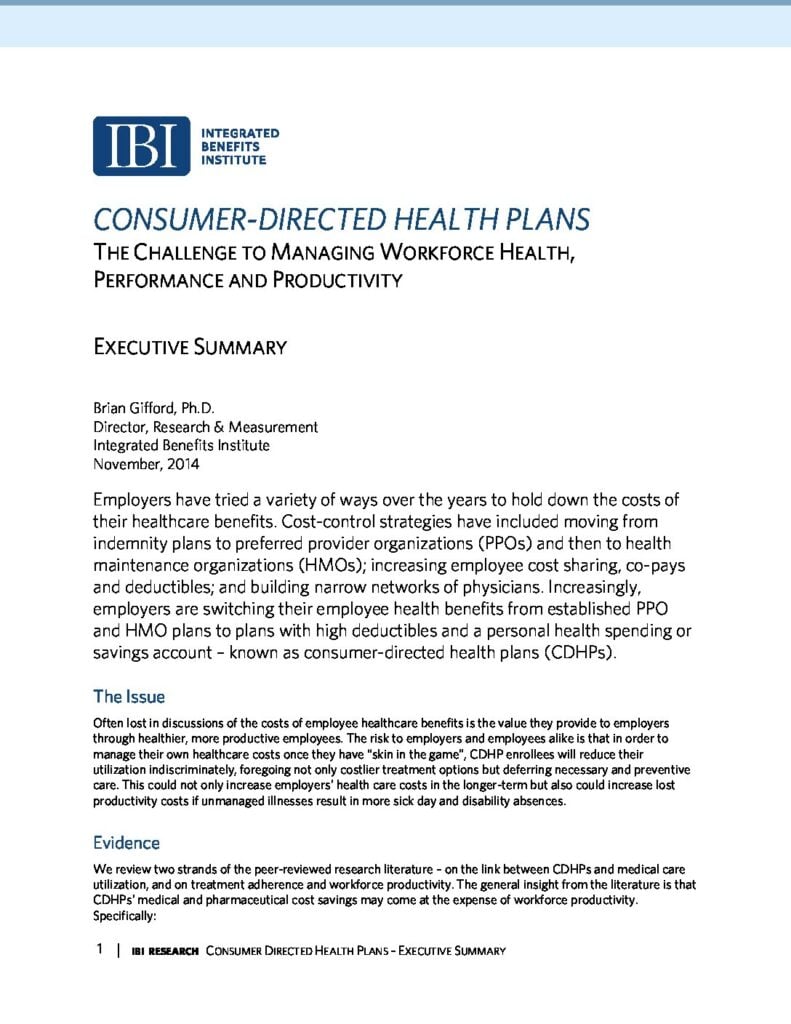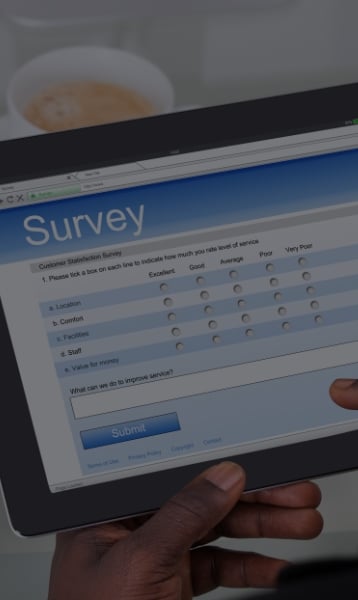The benchmarking portal gives you access to all reports available for STD, LTD, FML & WC.
New Study from Integrated Benefits Institute Found Only 24% of Companies had Business Continuity Plans in Place for Pandemics

Marshall Riddle
New Study from Integrated Benefits Institute Found Only 24% of Companies had Business Continuity Plans in Place for Pandemics
OAKLAND, CA – August 4, 2020 –While most companies had business continuity plans in place prior to COVID-19, only one in four reported having plans specifically for operating during a pandemic. As of May 2020, however, the number of companies with plans that address pandemics more than doubled to 61%. These are among the findings of a survey of 318 Chief Financial Officers (CFOs) and other corporate senior financial executives conducted by the Integrated Benefits Institute, a health and productivity research non-profit.
“While general continuity plans provide businesses some ability to improvise during novel emergencies, there is value in reviewing and revising these plans,” said Brian Gifford, PhD, Director, Research and Analytics at IBI. “Businesses that incorporated pandemic responses into their existing plans during the crisis have generally fared better than companies that did not. Companies can prepare for further COVID-19 outbreaks as well as disruptions from natural disasters and other future emergencies by ensuring that their health and leave benefits policies play a strategic continuity role.”
IBI will release later this year its comprehensive CFO survey findings that assess how senior financial executives view the impact of employees’ health and their health benefits strategy—including health care and disability insurance, paid leave and sick days, and wellness/wellbeing programs—on business performance. However, given the timing of the study, IBI also asked about how the COVID-19 pandemic has impacted business operations, employee benefits, and companies’ preparedness.
Additional findings related to planning around pandemics include:
- Nearly 40% of CFOs at companies with a pandemic plan prior to January 2020 reported that the COVID-19 was very disruptive to their businesses or caused a total shutdown. By contrast, half of CFOs at companies with only general continuity plans and nearly 75% at companies without any continuity plans reported that the pandemic was “very disruptive” or caused a total shutdown. COVID-19 was particularly disruptive for companies without continuity plans: more than a quarter reported a total shutdown.
- Work arrangements such as work from home and flexible worktime are the most widely adopted or expanded benefits. Companies that implemented pandemic continuity plans after January 2020 were most likely to adopt or expand benefits such as paid and unpaid leave, mental health resources, or work arrangements such as work from home or flextime. Companies with pandemic plans in place before 2020 were most likely to adopt rapid access to COVID-19 testing.
- Between 44% and 59% of CFOs from companies with pandemic-specific continuity plans in place prior to January 2020 were “very confident” that their health benefits strategy helped employees with financial, chronic health and mental health needs. These respondents also expressed the strongest agreement that their health benefits strategy would help their company resume business operations after the pandemic (41%). By contrast, no more than 34% of CFOs from other companies expressed similar confidence in their benefits, and no more than 21% strongly agreed that their health benefits strategy would help their company resume business operations after the pandemic.
“Few businesses could have envisioned the far-reaching disruption caused by the COVID-19 pandemic,” said Kelly McDevitt, IBI President. “As it will likely be some time until we are through the current health and economic crisis, organizations without a plan in place should consider creating one. And it is important to ensure that it is based on unbiased data and research to enable them to make the right decisions for both their employees’ needs and business challenges.”
Members of IBI’s research team drafted the survey in April 2020, and the survey was administered through Argyle Publishing between April 27, 2020 to May 27, 2020.
The analysis of the business continuity and pandemic planning survey can be found here. The full CFO survey findings will be released in September 2020 at the annual Health and Productivity Forum hosted by IBI and The Conference Board.
About Integrated Benefits Institute
The Integrated Benefit Institute’s independent research, industry-leading tools and data resources help companies link health-related programs to the outcomes that maximize the contributions of people to productivity and business performance. Founded in 1995, IBI is a national nonprofit research organization and business association serving 1,200 employer and supplier members and their 22 million employees. For additional information, please visit ibiweb.org and follow us on Twitter and LinkedIn.
# # #
- December 2024 (1)
- November 2024 (1)
- July 2024 (1)
- June 2024 (1)
- March 2024 (1)
- February 2024 (1)
- January 2024 (1)
- December 2023 (1)
- November 2023 (1)
- August 2023 (1)
- July 2023 (1)
- May 2023 (2)
- February 2023 (2)
- January 2023 (2)
- November 2022 (1)
- October 2022 (1)
- September 2022 (1)
- March 2022 (1)
- February 2022 (1)
- January 2022 (1)
- December 2021 (1)
- September 2021 (1)
- April 2021 (2)
- December 2020 (1)
- October 2020 (1)
- September 2020 (2)
- August 2020 (2)
- July 2020 (1)
- April 2020 (1)
- March 2020 (1)
- November 2019 (1)
- September 2019 (1)
- July 2019 (1)
- June 2019 (2)
- May 2019 (1)
- April 2019 (1)
- February 2019 (1)
- November 2018 (1)
- September 2018 (1)
- August 2018 (1)
- June 2018 (1)
- March 2018 (1)
- March 2017 (1)
- February 2017 (2)
- Absence (1)
- Absence Management (1)
- analytics (1)
- Behavioral Health (1)
- Benchmarking (2)
- Benchmarking Analytics (1)
- Benefit Design (2)
- Benefits + Plan Design (2)
- Blog (1)
- Business Performance (1)
- CDHP (1)
- CFO Survey (2)
- COVID-19 (6)
- Depression (3)
- director (1)
- Disability Leave (7)
- Extreme Weather (2)
- Family + Parental Leave (3)
- FMLA (2)
- Health + Productivity Management (3)
- Healthcare (1)
- Healthcare Costs (2)
- lost time (1)
- Manage Absence (2)
- Medication Adherence (1)
- Mental + Emotional Health (4)
- Mental Health (2)
- new hire (1)
- Parental / Family Leave (1)
- Patient-Centered (1)
- Press Releases (50)
- Preventive Care (1)
- Productivity (3)
- Research (2)
- Research Report (1)
- Return to Work (1)
- Sick Leave (2)
- Telehealth (1)
- Telemedicine (1)
- Worker's Compensation (1)
- Workplace Health Programs (1)




























